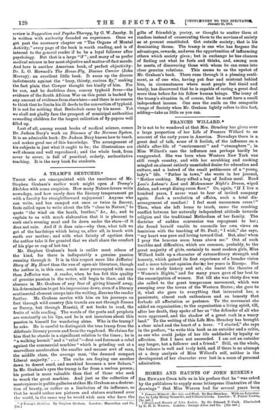A TRAMP'S SKETCHES.*
THOSE who are unacquainted with the excellence of Mr. Stephen Graham's earlier work might open A Tramp's Sketches with some suspicion. How many Nature-lovers write nowadays, and how rarely does the literary temperament go with a faculty for straightforward enjoyment ! Anyone who can write, and has camped out once or twice in Surrey, feels called upon to write about the life "close to Nature," to quote " the wind on the heath, brother," &c., &c., and to explain to us with much elaboration that it is pleasant to cook one's evening meal and lie down under the stars—if it does not rain. And if it does rain—why then, what talk we get of the hardships which bring us, after all, in touch with earth our mother; and with what fatuity of egotism does the author take it for granted that we shall share the comfort of his pipe or cup of hot tea !
Mr. Stephen Graham's book is unlike most others of the kind, for there is indisputably a genuine passion running through it. It is in this respect more like. Jefferies' Story of My Heart than the run of open-air literature, though the author is, in this case, much more preoccupied with men than Jefferies was. A reader, when be has felt this quality of genuine passion in the writer, will begin to thaw, and the absence in Mr. Graham of any fear of giving himself away, his determination to get his impressions down, even if a literary sentimental element creeps into the writing, disarms the reader further. Mr. Graham carries with him on his journeys on foot through wild country (his travels are not through Sussex or Surrey, but through Russia), if not books to read, the fruits of wide reading. The words of the poets and prophets are constantly on his lips, and he is not incurious about this passion in himself for wandering alone. Who is the tramp P he asks. He is careful to distinguish the true tramp from the dilettante literary person and from the vagabond. He claims for him that he stands in a significant relation to the times ; he is " a walking hermit " and a " rebel "—first and foremost a rebel against the commercial machine " which is grinding out at a marvellous acceleration the smaller and meaner sort of man, the middle class, the average man, the damned compact Liberal majority.' . . . The rocks are fraying one another down to desert sand, and mankind becomes a new Sahara." In Mr. Graham's eyes the tramp is far from a useless person ; his protest is more valuable than that of those who seek to wreck the great machine. And just as the collection of masterpieces in public galleries strikes Mr. Graham as a destruc- tion of beauty, or rather as a limitation of its influence, so that he would rather see pictures and statues scattered over the world, in the same way he would wish men who have the A Tramp's Skotet‘es. By Stephen Graham. London Macmillan and Co. [58.1 gifts of friendsh:p, poetry, or thought to scatter them at random instead of consecrating them to the services of society as at present constituted. Get outside society; that is his dominating theme. The tramp is one who has forgone the advantages, rewards, and even the opportunities of influencing others which society gives ; but in exchange he has chances of finding out what he feels and thinks, and, among men be meets, of discovering those with whom he can come into close genuine relations. This seems to us the upshot of Mr. Graham's book. There runs through it a pleasing senti- ment, as of one who, having put fear and mistrust behind him, in circumstances where most people feel timid and lonely, has discovered that he is capable of caring a great deal more than before for his fellow human beings. The irony of the tramp's situation is, of course, that he must have a small independent income. One sees the smile on the composite visage of Society when Mr. Graham lightly refers to this fact, adding—take as little as you can.


























































 Previous page
Previous page